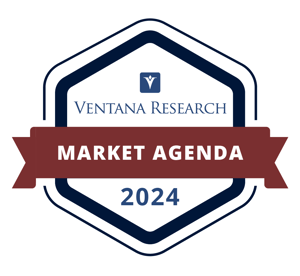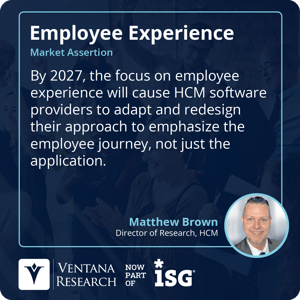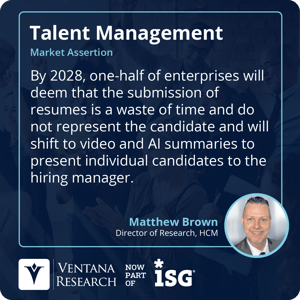Ventana Research recently announced its 2024 Market Agenda for Human Capital Management, continuing the guidance we have offered for two decades to help enterprises derive maximum potential from workforce- and people-related technology investments and initiatives. In crafting this Market Agenda, we focused on essential themes that are critical for HR organizations and for the software providers supporting them. The transformative nature of AI has not just begun to bring intelligence to HCM; it has introduced a human experience to the applications themselves. With generative AI, the digital experience has become more human through the use of natural language to interface with applications through voice or keyboard, aligning with the employee’s preferred method of communication.
We craft our market priorities through a combination of deep subject matter expertise, intimate knowledge of business trends and a solid understanding of technological advances  in software provider products. Through our continuous market research, we offer insights and best practices for both the lines of business and IT across industry verticals, helping enterprises realize maximum potential.
in software provider products. Through our continuous market research, we offer insights and best practices for both the lines of business and IT across industry verticals, helping enterprises realize maximum potential.
HCM focuses on engaging workers and managers with applications and processes that elevate workforce contributions and engagement, creating and sustaining sources of business value and competitive advantage. HR organizations must maintain a degree of agility, and access to information is required to respond to changing macroeconomic and business conditions impacting the workforce.
By 2027, HCM software providers will realize the limitations of their application suites and will transition to focus on GenAI and worker twins to engage HR and managers for requests and notifications. HCM applications and technology platforms must balance the requirement for automation and workflow across human resources and business processes. Also important are the intelligence and insights that enable the workforce to act on existing skill gaps and forge new career paths while still achieving managers’ expectations. Key to this balancing act is increased emphasis on engagement and experiences that give the workforce confidence that the enterprise is vested in their success. In 2024, we will conduct Buyers Guide Research into the HCM suites covering talent management and HRMS.
Our Human Capital Management Market Agenda includes six focus areas that address these business results: Employee Experience, Learning Management, Talent Management, Total Compensation Management, Payroll Management and Workforce Management.
Employee Experience
Employee experience is defined by what employees observe, encounter and feel throughout their tenure at an organization. Positive employee experience leads to better engagement and productivity, and enterprises are investing in technology to support personalization of experiences to drive business outcomes. By 2027, the focus on employee experience will cause HCM software providers to adapt and redesign their approach to emphasize the employee journey, not just the application. The ability to achieve this can be possible with advancements in GenAI and engaging workers within the personalized context of their role and expectations. Our continuous market research will cover Employee Experience in our Buyers Guide on HCM Suites.
and productivity, and enterprises are investing in technology to support personalization of experiences to drive business outcomes. By 2027, the focus on employee experience will cause HCM software providers to adapt and redesign their approach to emphasize the employee journey, not just the application. The ability to achieve this can be possible with advancements in GenAI and engaging workers within the personalized context of their role and expectations. Our continuous market research will cover Employee Experience in our Buyers Guide on HCM Suites.
Learning Management
Learning management is the process of enabling the workforce to develop skills and competencies needed to maximize the impact of work while providing desired productivity and effectiveness. To improve business results, enterprises are embracing the learning technology platforms that do the best job of enhancing the learning experience. This requires personalization of content, medium and pace to resonate with learners as individuals seek to advance their skills and define career paths within the enterprise. By 2027, the transition of learning systems to engage workers in a more consumer-like “binge-watching” experience will cause one-third of enterprises to re-examine their software providers. Achieving this personalized level of engagement will require the use of AI to best present skills development that aligns to the individual’s desires and the enterprise’s needs. We will continue our Buyers Guides Research in Learning Management and software provider assessment to help guide enterprises on the products that best fit their requirements and business needs.
Payroll Management
Payroll management used to be conducted only in standard cycles, with workers being paid on the same day and in the same, repeatable, predefined periods. Now, AI and automation have reduced or eliminated many labor-intensive, error-prone payroll tasks so HR can leverage payroll technology investments to do more than just pay people accurately and on time. Through 2026, payroll management software providers will be expected to provide more flexible means to communicate benefits through pay by providing or integrating with document design tools. A focus on improved employee experiences with pay and related benefits is essential, as is ensuring reliability and timeliness of payroll processes. We will maintain our Buyers Guide Research in Payroll Management covering domestic, multi-country and global, providing insights on the software providers that best fit the requirements of enterprises.
Talent Management
Talent management encompasses activities to ensure employee experiences—from hiring to onboarding to career and work engagement—are governed and managed in ways that are as effective for the worker as they are for the entire workforce. These areas of investment span candidate engagement in the recruiting process, hiring and onboarding, internal mobility, establishing and monitoring expectations through performance management and the use of skills development to ensure succession-planning goals are fulfilled.
To win or keep the best talent, HR must make the hiring process personalized and enjoyable, and a traditional applicant tracking system (ATS) simply cannot support that mandate. Responding to market demands, technology providers have evolved offerings to the point where the right system underlying candidate-focused processes can be a competitive differentiator when it comes to recruiting and retention. The very activities that define talent acquisition have grown beyond what used to be advertising, interviewing and extending an offer of employment. Personalized employment marketing campaigns, skill and/or interest-based dynamic job presentation, interview self-scheduling and even onboarding (to some degree) now all fall under the heading of talent acquisition, and rightfully so. Further, business leaders are looking at the talent pool more holistically than ever, considering external, internal and contractor talent equally, marketing opportunities directly to all, with messaging specifically curated to individual needs. A traditional ATS does not have a robust enough feature set to meet all those needs, but an advanced talent acquisition suite does. By 2028, one-half of enterprises will deem that the submission of resumes is a waste of time and do not represent the candidate and will shift to video and AI summaries to present individual candidates to the hiring manager.
Responding to market demands, technology providers have evolved offerings to the point where the right system underlying candidate-focused processes can be a competitive differentiator when it comes to recruiting and retention. The very activities that define talent acquisition have grown beyond what used to be advertising, interviewing and extending an offer of employment. Personalized employment marketing campaigns, skill and/or interest-based dynamic job presentation, interview self-scheduling and even onboarding (to some degree) now all fall under the heading of talent acquisition, and rightfully so. Further, business leaders are looking at the talent pool more holistically than ever, considering external, internal and contractor talent equally, marketing opportunities directly to all, with messaging specifically curated to individual needs. A traditional ATS does not have a robust enough feature set to meet all those needs, but an advanced talent acquisition suite does. By 2028, one-half of enterprises will deem that the submission of resumes is a waste of time and do not represent the candidate and will shift to video and AI summaries to present individual candidates to the hiring manager.
We will research how enterprises use applications to support the merits of talent management and will conduct Buyers Guide Research examining how software providers are meeting the talent lifecycle requirements in applications to support onboarding, performance, and career advancement.
Total Compensation Management
Total compensation management is the practice of managing the processes and information that ensure an integrated and more comprehensive approach to incentivizing, rewarding and recognizing workers for work provided. Recent regulatory and legal mandates, combined with social pressures and changes in organizational values, have put the need for fair and equitable pay at the core of many compensation strategies. Our research leads us to assert that through 2026, one-quarter of enterprises will require that industry benchmarking of compensation is easily integrated to their compensation software to ensure effective pay insights on a continuous basis. We will build upon our released Buyers Guide on Total Compensation Management and provide an update to guide enterprises as they assess and select the best application for their needs.
Workforce Management
Workforce management is a broad range of activities used to oversee the work of directly employed or contracted workers. It includes features like time and attendance, forecasting and scheduling, absence management and integration with the payroll process for non-exempt or hourly workers. Workforce planning has become much more dynamic and accurate via AI-infused systems, and scheduling optimization capabilities now enable enterprises to factor in employee preferences to mitigate typically high turnover in hourly jobs. Through 2027, the needs for managing time worked will include using AI and sensors to provide knowledge of when worker activity is detected. We will publish an update to our Buyers Guide on Workforce Management to guide the assessment and selection of software providers and products.
Overall, as we enter 2024, we expect to see HR leaders focusing on ensuring the adaptive resiliency of the workforce by advancing the competency and skill expectations of business leaders. The advancements in AI will allow HR to instrument a more human approach to HCM and the applications that support the processes across the enterprise.
Be sure to subscribe to our Ventana Research community to stay up to date on our market research efforts. Check out the Human Capital Management topic and focus area pages for our detailed market agenda and continuously updated 90-day calendar as well as more research facts and best practices.
Regards,
Matthew Brown

 in software provider products. Through our continuous market research, we offer insights and best practices for both the lines of business and IT across industry verticals, helping enterprises realize maximum potential.
in software provider products. Through our continuous market research, we offer insights and best practices for both the lines of business and IT across industry verticals, helping enterprises realize maximum potential.  and productivity, and enterprises are investing in technology to support personalization of experiences to drive business outcomes. By 2027, the focus on employee experience will cause HCM software providers to adapt and redesign their approach to emphasize the employee journey, not just the application. The ability to achieve this can be possible with advancements in GenAI and engaging workers within the personalized context of their role and expectations. Our continuous market research will cover Employee Experience in our Buyers Guide on HCM Suites.
and productivity, and enterprises are investing in technology to support personalization of experiences to drive business outcomes. By 2027, the focus on employee experience will cause HCM software providers to adapt and redesign their approach to emphasize the employee journey, not just the application. The ability to achieve this can be possible with advancements in GenAI and engaging workers within the personalized context of their role and expectations. Our continuous market research will cover Employee Experience in our Buyers Guide on HCM Suites. Responding to market demands, technology providers have evolved offerings to the point where the right system underlying candidate-focused processes can be a competitive differentiator when it comes to recruiting and retention. The very activities that define talent acquisition have grown beyond what used to be advertising, interviewing and extending an offer of employment. Personalized employment marketing campaigns, skill and/or interest-based dynamic job presentation, interview self-scheduling and even onboarding (to some degree) now all fall under the heading of talent acquisition, and rightfully so. Further, business leaders are looking at the talent pool more holistically than ever, considering external, internal and contractor talent equally, marketing opportunities directly to all, with messaging specifically curated to individual needs. A traditional ATS does not have a robust enough feature set to meet all those needs, but an advanced talent acquisition suite does. By 2028, one-half of enterprises will deem that the submission of resumes is a waste of time and do not represent the candidate and will shift to video and AI summaries to present individual candidates to the hiring manager.
Responding to market demands, technology providers have evolved offerings to the point where the right system underlying candidate-focused processes can be a competitive differentiator when it comes to recruiting and retention. The very activities that define talent acquisition have grown beyond what used to be advertising, interviewing and extending an offer of employment. Personalized employment marketing campaigns, skill and/or interest-based dynamic job presentation, interview self-scheduling and even onboarding (to some degree) now all fall under the heading of talent acquisition, and rightfully so. Further, business leaders are looking at the talent pool more holistically than ever, considering external, internal and contractor talent equally, marketing opportunities directly to all, with messaging specifically curated to individual needs. A traditional ATS does not have a robust enough feature set to meet all those needs, but an advanced talent acquisition suite does. By 2028, one-half of enterprises will deem that the submission of resumes is a waste of time and do not represent the candidate and will shift to video and AI summaries to present individual candidates to the hiring manager. 








